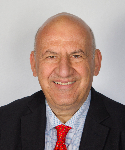| Biography | |
|---|---|
 Prof. P. Takis Mathiopoulos Department of Informatics and Telecommunications, National and Kapodistrian University of Athens, Greece |
|
| Title: Hybrid Satellite-Terrestrial Networks for 5G/6G Communication Systems | |
| Abstract:
Hybrid satellite-terrestrial networks (HSTNs) are a promising solution in dealing with coverage and mobility challenges encountered in 5G/6G communication systems that employ novel multiple access and connectivity schemes.
In this talk, first we will briefly explaining why the integration of satellite systems with their terrestrial counterparts is important for the success of 5G/6G and beyond networks. Then, we will be discussing the application of non-orthogonal multiple access (NOMA) and network coding (NC) schemes to such HSTNs. Our motivation is to capitalize, in a combined way, the significant performance improvements offered by both schemes individually, which not only improve the quality of wireless transmission but also effectively exploit the available spectrum. Novel approaches will be presented as for such HSTNs the mobile users will be simultaneously served through NOMA via the terrestrial base station (BS) and the satellite link whereas the satellite employs NC to improve the performance when errors occur. It will be shown that, as compared to standalone NOMA, such approaches lead to significant performance improvements under various operational conditions without any significant computational requirements. We will conclude this talk by discussing several open research problems which, in our view, will lead to new research directions in the field of HSTNs.
| |
| Biography:
P. Takis Mathiopoulos received the Ph.D. degree in digital communications from the University of Ottawa, Ottawa, Canada, in 1989. From 1982 to 1986, he was with Raytheon Canada Ltd., working in the areas of air navigational and satellite communications.
In 1989, he joined the Department of Electrical and Computer Engineering (ECE), University of British Columbia (UBC), Vancouver, Canada, as an Assistant Professor and where he was a faculty member until 2003, holding the rank of Professor from 2000 to 2003. From 2000 to 2014, he was the Director (2000 - 2004) and then the Director of Research of the Institute for Space Applications and Remote Sensing (ISARS), National Observatory of Athens (NOA). Since 2014, he is Professor of Telecommunications at the Department of Informatics and Telecommunications, National and Kapodistrian University of Athens, Athens, Greece. He also held visiting faculty long term honorary academic appointments as Guest Professor at South West Jiao Tong University (SWJTU), Chengdu, China, and Guest (Global) Professor at Keio University, Tokyo, Japan.
His research activities and contributions have dealt with wireless terrestrial and satellite communication systems and network as well as in remote sensing, LiDAR systems, and information technology, including blockchain systems. In these areas, he has coauthored 140 journal papers published mainly in various IEEE journals, 1 book (edited), 5 book chapters, and more than 140 conference papers. Dr. Mathiopoulos has been or currently serves on the editorial board of several archival journals, including the IET Communications as an Area Editor, the IEEE Transactions on Communications, the Remote Sensing Journal, and as Specialty Chief Editor for the Arial and Space Network Journal of Frontiers.
From 2001 to 2014, he has served as a Greek Representative to high-level committees in the European Commission and the European Space Agency. He has been a member of the Technical Program Committees (TPC) for numerous IEEE and other international conferences and has served as TPC Vice Chair of several IEEE conferences. He has delivered numerous invited presentations, including plenary and keynote lectures, and has taught many short courses all over the world. As a faculty memberUBC, he has been awarded an Advanced Systems Institute (ASI) Fellowship as well as a Killam Research Fellowship. He is also the co-recipient of two best conference paper awards and has received by the IEEE Communication Society the Satellite and Space Communication Technical Committee “2017 Distinguished Service Award” foroutstanding contributions in the field of Satellite and Space Communications.
| |
